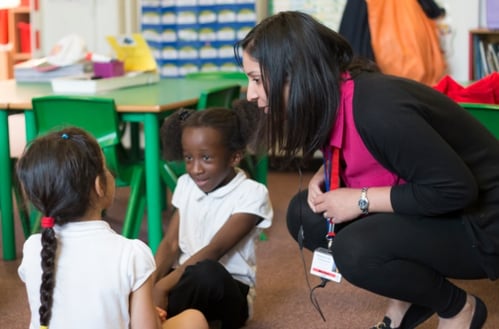Teacher research is a powerful tool for professional learning. It has the potential to enhance and improve teaching and learning as well as increase teachers’ motivation and boost confidence (read about one teacher’s experience here).
It can also give teachers an added feeling of professional autonomy because, unlike conventional training courses, it’s driven and conducted by teachers themselves. The National Education Association list various other benefits here.
 Teacher research: a collaborative process
Teacher research: a collaborative process
Teachers are engaged in informal research on a daily basis by being reflective, trying new things and observing the impact on learning. What separates teacher research from the everyday is a teacher’s intent to improve classroom practice through systematic inquiry.
However, it's important not to see teacher research as an activity to be carried out in isolation. In fact, the process and outcomes are enhanced when teachers collaborate.
When teacher research is carefully planned and based on informed decisions, it can lead to meaningful results that can be confidently used to base future decisions about teaching and learning. It can also be shared with the wider community for greater benefit.
The challenges of teacher research
There are many good reasons why teachers should engage in teacher research but what are the challenges?
- Although teacher research can be integrated into regular classroom activities, if it's going to be effective then it needs time to be spent planning, doing, analysing and sharing the research. Teacher workload can make this a challenge.
- Teachers may not have undertaken research before and may need additional training and support to learn about data collection (e.g. using interviews, self-observation, and simple questionnaires).
6 ways to encourage teachers to become researchers in their classrooms:
- Through Lesson Study; a proven way to impact student outcomes. Get your practical guide to Lesson Study.
- Support teachers taking part in action research or teacher triads, and encourage them to share their findings so others benefit as well.
- Make it easy for teachers to engage with research evidence and encourage an evidence-informed culture by making research findings accessible; identifying context-specific evidence for teachers; making it a whole school priority; and using appropriate internal and external support.
- Keep track of the impact of new strategies implemented in classrooms and across the school, so you know what does and doesn't work.
- If teachers have shown interest in or are enrolled on a formal qualification, such as a masters degree or diploma, encourage them to share their findings across the school and use their classroom as a place to explore and test ideas and strategies.
- Encourage the use of video, it will save your staff time when working collaboratively and give an objective insight into both learner and teacher behaviours.
If you have IRIS Connect, encourage your staff to collect and analyse data using the Forms tool (check out the Statify Group in the platform for sample forms you can clone and use).
Resources
A number of resources exist to support teachers who are interested in doing research. Here are a few of them:
- The value of action research: Broadening evidence base for teachers
- A practical guide to Lesson Study
Do you know of any other resources around teacher research? Share them in the comments below.



Leave a comment:
Get blog notifications
Keep up to date with our latest professional learning blogs.